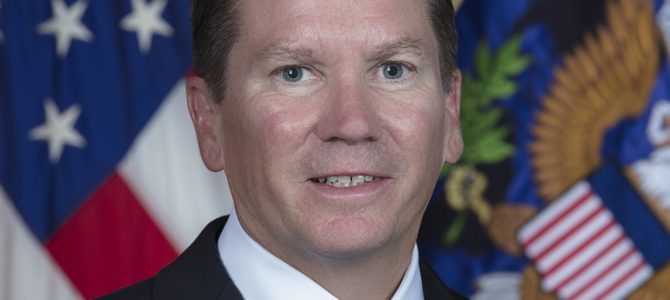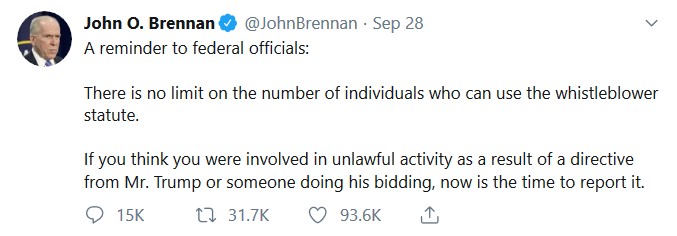
After Federalist reporting unearthed the Intelligence Community Inspector General’s (ICIG’s) material changes to its whistleblower complaint intake procedures, a battle has ensued over whether the changes matter.
This discovery continues to captivate elected representatives, Capitol insiders, and political talking heads across the nation. President Trump tweeted Monday morning, asking emphatically “WHO CHANGED THE LONG STANDING WHISTLEBLOWER RULES JUST BEFORE SUBMITTAL OF THE FAKE WHISTLEBLOWER REPORT? DRAIN THE SWAMP!”

The president’s tweet appears to have prompted the impeachment cheerleaders at The Daily Beast to claim “Trump [had] joined an army of conservative commentators in pushing a false story” and smearing his own ICIG, Michael Atkinson. Other outlets and commentators piled on. But is the story false?
There Is No Dispute that the Form Changed
The detractors are right about one thing: the Intelligence Community Whistleblower Protection Act (ICWPA) statute doesn’t actually prohibit a purported whistleblower from initiating a complaint based on hearsay. But the clear language of the previous IC IG guidance never stated that it did. As Sean Davis reported in The Federalist Friday, quoting from the original documents:
A previous version of the whistleblower complaint document, which the ICIG and DNI until recently provided to potential whistleblowers, declared that any complaint must contain only first-hand knowledge of alleged wrongdoing and that complaints that provide only hearsay, rumor, or gossip would be rejected.
‘The [Intelligence Community Inspector General] cannot transmit information via the ICPWA based on an employee’s second-hand knowledge of wrongdoing,’ the previous form stated under the bolded heading ‘FIRST-HAND INFORMATION REQUIRED.’ ‘This includes information received from another person, such as when an employee informs you that he/she witnessed some type of wrongdoing.’
‘If you think that wrongdoing took place, but can provide nothing more than second-hand or unsubstantiated assertions, [the Intelligence Community Inspector General] will not be able to process the complaint or information for submission as an ICWPA.’
The documents clearly show the process was changed, and the previously explicit regulatory requirements for first-hand information were suddenly eliminated. It is undisputed that the instructions for the form have changed.
Under the law, the ICIG is the office that sets the internal policy and instructions for reporting and investigating whistleblower complaints. While the ICIG would likely have been obligated to make a preliminary inquiry regardless of the provenance of the information, it is entirely reasonable from an administrative process standpoint that an organization with the ICIG’s responsibilities would consider it desirable to discourage hearsay allegations in favor of first-hand complaints.
It isn’t too hard to imagine a scenario where the ICIG reporting system could be overwhelmed if hearsay allegations were encouraged. Former CIA director John Brennan’s tweet over the weekend exhorting federal officials to report the president “or someone doing his bidding” is just one example of how the system could potentially be overwhelmed with spurious allegations.

In fact, the ICIG is well aware of the need to balance the workload unique to the organization he leads. In preparation for his Senate confirmation hearing on January 17, 2018, Atkinson answered a prepared question about the ability to investigate whistleblower complaints in a timely and thorough manner as follows: “the IC IG has a unique statutory requirement to make a credibility determination on a matter of ‘urgent concern’ reported by whistleblowers within fourteen (14) days of receiving such reports. Given the relatively short statutory time frame, the IC IG should have an appropriate intake and evaluation process in place to permit the IC IG to fulfill its statutory obligation.”
Late yesterday the IC IG finally provided a public explanation in a news release, where they acknowledged the changes to the form instructions were made in part “in response to recent press inquiries regarding the [Ukraine] whistleblower complaint.” Clearly the IC IG understood the potential for a public outcry if he certified a complaint as “credible” where the whistleblower stated “I was not a direct witness to most of the events described” while the instructions for his own intake form still listed a warning that “[t]he IC IG cannot transmit information via the ICPWA based on an employee’s second-hand knowledge of wrongdoing.”
The IG Shall Determine Whether the Complaint is Credible
As defined in the ICWPA, the ICIG’s duties include an obligation “to initiate and conduct independent investigations” (U.S.C. §3033(e)). Further, he “shall determine whether the complaint or information appears credible. Upon making such a determination, the Inspector General shall transmit to the Director a notice of that determination, together with the complaint or information” (U.S.C. §3033(k)(5)(B)).
Ironically, the Daily Beast article inadvertently destroys its own claim that this is a “false story.” In their zeal to dismiss the importance of the altered requirement for first-hand knowledge, the article explains that first-hand evidence is the threshold to determine what is “credible” under the statute: “Though the text is confusingly drafted—which may be why the entire preamble was canned—a careful reading shows it’s not erecting a new hurdle for filing a whistleblower complaint, but rather describing the type of evidence the IC IG has to gather to judge the complaint ‘credible’ at the end of its 14-day investigation.”
Setting aside the laughable fig leaf of an excuse offered for the reason the revision was made (the “confusing” text is actually quite explicit in the previous form’s instructions), it appears many debating this issue are conflating the standard for justifying and acting on a complaint with the standard for assessing its credibility. Once a complaint is filed, what is the standard for determining if it meets the threshold of a “credible” complaint?
During his Senate confirmation hearing on January 17, 2018, Atkinson stated, “The IC IG has the responsibility to determine whether the complaint or information appears credible,” and promised that “I will work to ensure that ICIG personnel conduct investigations, inspections, audits, and reviews in accordance with Quality Standards promulgated by CIGIE to keep those activities free from personal, external, and organizational impairments.”
CIGIE is the Council of the Inspectors General on Integrity and Efficiency, and among the guidance they have periodically promulgated is the November 15, 2011 document “QUALITY STANDARDS FOR INVESTIGATIONS.” Among its guidelines: “Objectivity—Evidence must be gathered and reported in an unbiased and independent manner in an effort to determine the validity of an allegation or to resolve an issue. This includes inculpatory and exculpatory information.”
Did the ICIG conduct an objective investigation? If so, did his investigation uncover any first-hand sources to substantiate the allegations, or did he just deem the complaint credible? Did his report of investigation uncover the widely reported dramatic inconsistencies in the complaint, or was he unaware of how wildly speculative most of the document was?
With so many obvious factual inconsistencies in the whistleblower report, how did the ICIG find the complaint credible? And why did he feel compelled to certify it as an “Urgent Concern” under the statute over the clearly articulated determination of the Director of National Intelligence’s Office of General Counsel?
In his confirmation hearing in 2018, Atkinson addressed contemporaneous press criticism that the ICIG’s office was “barely functioning” by stating, “Simply put, the IC IG needs to get its own house in order. The sooner, the better.” More than 21 months later, it appears to still be true.
It’s an open question if the ICIG intentionally fumbled when he sidestepped the DNI’s Office of Legal Counsel determination, if he was coerced to pass along an allegation that should have been dismissed for lack of merit, or if he simply decided to punt because he didn’t want to get left holding the ball on something that was assuredly going to leak.
But moving forward, the most important question may very well center on whether House Intelligence Committee Chairman Adam Schiff will expand his invitation to Atkinson to testify about these questions publicly, or will the Democrats’ impeachment narrative be better served by letting those questions go unanswered, or answered within the closed-door classified session scheduled for Friday?









